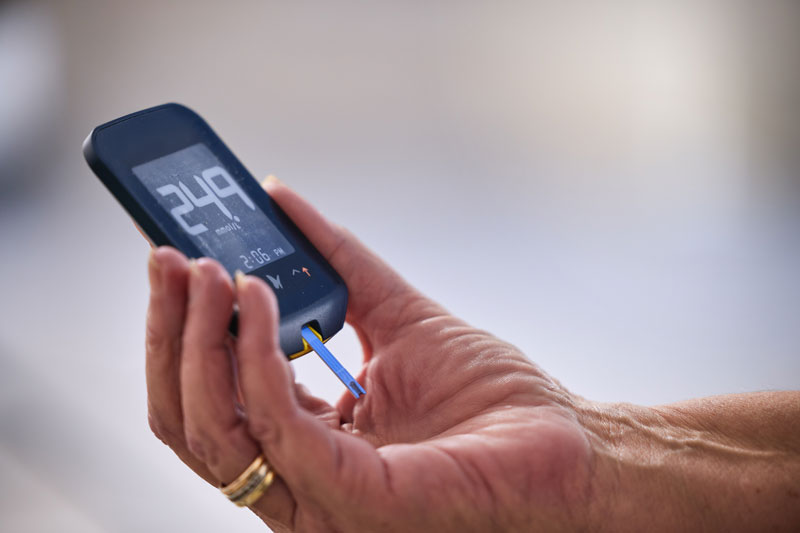What is Type 2 Diabetes Mellitus?
Type 2 diabetes mellitus is a metabolic disorder in which the body becomes resistant to insulin and/or does not produce enough insulin to maintain normal blood sugar levels. Insulin is a hormone produced by the pancreas that helps to regulate blood sugar levels by allowing glucose (sugar) to enter cells to be used as energy.
In type 2 diabetes, the cells in the body become less responsive to insulin, which causes glucose to build up in the bloodstream instead of being absorbed by the cells. This is known as insulin resistance. Over time, the pancreas may not produce enough insulin to keep up with the body’s needs.
Type 2 diabetes is the most common type of diabetes. It typically develops slowly over time and may not cause noticeable symptoms at first. However, if left untreated or poorly managed, type 2 diabetes can lead to serious health complications such as nerve damage, kidney damage, cardiovascular disease, and eye damage.

What Causes Type 2 Diabetes Mellitus?
Type 2 diabetes mellitus is a complex condition that is associated with a combination of genetic, lifestyle, and environmental factors. Some of the factors associated with the development of type 2 diabetes include:
- Obesity: Overweight or obesity increases the risk of developing insulin resistance, which is a key factor in the development of type 2 diabetes.
- Physical inactivity: Lack of physical activity can contribute to the development of insulin resistance and type 2 diabetes.
- Suboptimal diet: Eating a diet high in refined carbohydrates, simple sugars, and saturated and trans fats can increase the risk of developing type 2 diabetes.
- Genetics: Certain genetic mutations can increase the risk of developing type 2 diabetes, although the exact genetic factors involved are not fully understood.
- Age and ethnicity: The risk of developing type 2 diabetes increases with age, and certain ethnic groups. African Americans, Hispanic Americans, and Native Americans have a higher risk than others.
- Gestational diabetes: Women who develop gestational diabetes during pregnancy have a higher risk of developing type 2 diabetes later in life.
- Other medical conditions: Certain medical conditions such as polycystic ovary syndrome (PCOS) and sleep apnea can increase the risk of developing type 2 diabetes.

Symptoms of Type 2 Diabetes Mellitus
Type 2 diabetes mellitus can cause a range of symptoms that can vary from person to person. Some people may not experience any noticeable symptoms, while others may experience several. Symptoms of type 2 diabetes can include:
- Increased thirst and urination: Elevated blood sugar levels can cause the body to produce more urine, which can lead to increased thirst and more frequent urination.
- Fatigue: High blood sugar levels can cause fatigue and a lack of energy.
- Blurred vision: High blood sugar levels can cause the lens in the eye to swell, which can lead to blurred vision.
- Slow healing: High blood sugar levels can slow down the body’s ability to heal wounds and infections.
- Numbness and tingling: High blood sugar levels can damage nerves, leading to numbness and tingling in the hands and feet.
- Increased hunger: Insulin resistance can cause the body to crave more food, leading to increased hunger.
- Weight loss: Some people with type 2 diabetes may experience unintentional weight loss because the body can’t use the high blood sugar levels as energy, and the body begins to use fat and muscle for energy.
It is important to note that some people with type 2 diabetes may not experience any symptoms, or their symptoms may be so mild that they go unnoticed. Regular blood sugar monitoring and screening for diabetes are important for early detection and management of the condition.

How does Dr. Kanji treat type 2 diabetes mellitus?
Treatment for type 2 diabetes mellitus is personalized to each individual’s needs and health status. General goals are to optimize blood sugar levels and prevent or manage complications. Types of treatment may include:
- Nutrition and activity: Strategies for improving nutrition and increasing activity can improve insulin sensitivity and blood sugar levels.
- Oral medications: There are several oral medications that can be used to help lower blood sugar levels, including metformin, sulfonylureas, DPP-4 inhibitors, and SGLT2 inhibitors.
- Non-insulin injectables: These include the Glucagon-like Peptide-1 (GLP-1) Receptor Agonists, such as Ozempic and Trulicity, and the GLP-1/GIP Receptor Agonists such as Mounjaro.
- Insulin therapy: Some people with type 2 diabetes may need insulin to help control their blood sugar levels. Insulin can be administered via injection or an insulin pump.
- Weight loss surgery: In some cases, weight loss surgery may be recommended for individuals with type 2 diabetes and obesity who have not been able to achieve adequate blood sugar control with other treatments.
Frequently Asked Questions about Type 2 Diabetes
Is controlling blood sugar the only focus for treating type 2 diabetes mellitus?
No. Dr. Kanji emphasizes managing cardiovascular risk by monitoring blood pressure and cholesterol. He also monitors for complications such as nerve damage, kidney damage, and eye damage.
How common is type 2 diabetes mellitus?
Type 2 diabetes mellitus is a common condition, affecting millions of people worldwide. It is more common in adults, but it can occur at any age.
What are the risk factors for developing type 2 diabetes mellitus?
The risk factors for type 2 diabetes mellitus include a family history of diabetes, physical inactivity, high blood pressure or high cholesterol levels, and age over 45.
Can type 2 diabetes mellitus be prevented?
Lifestyle changes such as maintaining a healthy weight, optimal nutrition, and increasing physical activity can help to reduce the risk of developing type 2 diabetes mellitus. In some cases, medication may also be recommended to help prevent or delay the onset of type 2 diabetes in high-risk individuals.
How is type 2 diabetes mellitus diagnosed?
Type 2 diabetes mellitus is typically diagnosed through blood tests that measure fasting blood sugar levels or a hemoglobin A1C test. These tests can help to determine if blood sugar levels are within a healthy range.
What are the complications of type 2 diabetes mellitus?
Complications of type 2 diabetes mellitus can include nerve damage, kidney damage, eye damage, foot problems, and an increased risk of heart disease and stroke.
How is type 2 diabetes mellitus treated?
Treatment for type 2 diabetes mellitus typically involves lifestyle changes such as weight loss, dietary changes, increased physical activity, and medications.
Can type 2 diabetes mellitus be cured?
Type 2 diabetes mellitus cannot be cured, but it can be managed with proper treatment and self-care. With appropriate lifestyle changes and medication, many people with type 2 diabetes mellitus are able to achieve good blood sugar control and prevent or manage complications.





